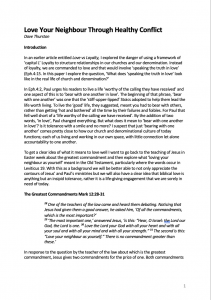In an earlier article entitled Love vs Loyalty, I explored the danger of using a framework of ‘capital L’ Loyalty to structure relationships in our churches and our denomination. Instead of loyalty, we are commanded to love and that would involve ‘speaking the truth in love’ (Eph.4:15. In this paper I explore the question, ‘What does ‘speaking the truth in love’ look like in the real life of church and denomination?’
In Eph.4:2, Paul urges his readers to live a life ‘worthy of the calling they have received’ and one aspect of this is to ‘bear with one another in love’. The beginning of that phrase, ‘bear with one another’ was one that the ‘stiff-upper-lipped’ Stoics adopted to help them lead the life worth living. To live the ‘good’ life, they suggested, meant you had to bear with others, rather than getting ‘hot and bothered’ all the time by their failures and foibles. For Paul that fell well short of a ‘life worthy of the calling we have received’. By the addition of two words, ‘in love’, Paul changed everything. But what does it mean to ‘bear with one another in love’? Is it tolerance with a smile and no more? I suspect that just ‘bearing with one another’ comes pretty close to how our church and denominational culture of today functions; each of us living and working in our own space, with little connection let alone accountability to one another.
To get a clear idea of what it means to love well I want to go back to the teaching of Jesus in Easter week about the greatest commandment and then explore what ‘loving your neighbour as yourself’ meant in the Old Testament, particularly where the words occur in Leviticus 19. With this as a background we will be better able to not only appreciate the contours of Jesus’ and Paul’s ministries but we will also have a clear idea that biblical love is anything but an insipid tolerance, rather it is a life-giving engagement that we are sorely in need of today.
The Greatest Commandments Mark 12:28-31
28 One of the teachers of the law came and heard them debating. Noticing that Jesus had given them a good answer, he asked him, ‘Of all the commandments, which is the most important?’
29 ‘The most important one,’ answered Jesus, ‘is this: “Hear, O Israel: the Lord our God, the Lord is one. 30 Love the Lord your God with all your heart and with all your soul and with all your mind and with all your strength.” 31 The second is this: “Love your neighbour as yourself.” There is no commandment greater than these.’
In response to the question by the teacher of the law about which is the greatest commandment, Jesus gives two commandments for the price of one. Both commandments are framed by love; the first, loving the Lord our God with the totality of who we are (Deut.6:4,5) and the second, loving your neighbour as yourself, (Lev.19:18 ).
It is easy to imagine we already know what ‘loving your neighbour as yourself’ means in our individualistic culture where we are free do what we like as long as it doesn’t impinge on another’s freedom, but this is reading into the text our own context and for Jesus and Paul, love for neighbour is much more demanding than a ‘reasonable’ indifference.
Leviticus 19:9-18
9 ‘“When you reap the harvest of your land, do not reap to the very edges of your field or gather the gleanings of your harvest. 10 Do not go over your vineyard a second time or pick up the grapes that have fallen. Leave them for the poor and the foreigner. I am the LORD your God.
11 ‘“Do not steal.
‘“Do not lie.
‘“Do not deceive one another.
12 ‘“Do not swear falsely by my name and so profane the name of your God. I am the LORD.
13 ‘“Do not defraud or rob your neighbour.
‘“Do not hold back the wages of a hired worker overnight.
14 ‘“Do not curse the deaf or put a stumbling-block in front of the blind, but fear your God. I am the LORD.
15 ‘“Do not pervert justice; do not show partiality to the poor or favouritism to the great, but judge your neighbour fairly.
16 ‘“Do not go about spreading slander among your people.
‘“Do not do anything that endangers your neighbour’s life. I am the LORD.
17 ‘“Do not hate a fellow Israelite in your heart. Rebuke your neighbour frankly so that you will not share in their guilt.
18 ‘“Do not seek revenge or bear a grudge against anyone among your people, but love your neighbour as yourself. I am the LORD.
The statement ‘love your neighbour as yourself’ functions as a summary of all the different instructions that go before including elements of the ten commandments, principles of social justice as well as instructions addressed to our motives. For me the most counter-cultural command is contained in v17:
17 ‘“Do not hate a fellow Israelite in your heart. Rebuke your neighbour frankly so that you will not share in their guilt.
Seeing a neighbour doing that which is wrong and not rebuking them is to hate them in your heart and by doing that you will share in their guilt. What we see at work here is a set of commands that are not only designed to form a coherent loving community but a community that is an expression of the love of the LORD. True love of neighbour, according to Leviticus and Jesus and Paul does not exclude difficult conversations or even rebukes because the truth matters more than the ‘freedom’ to damage ‘self’.
The Ministries of Jesus and Paul
Both the ministries of the Lord Jesus and Paul and correspondence of Paul fit the love described in Leviticus 19:6-18 and make sense of what are to us robust and confrontational responses to persons and situations.
Jesus’ cleansing the temple; pronouncing the woes on the scribes and Pharisees as well as cleansing the leper with a touch and forgiving the lame man are love in action.
Paul’s difficult correspondence with the Galatians and the divided Corinthian church in our 2 Corinthians is the rebuke of someone who loves well. Paul’s commitment to truthing in love is further spelled out in his letter to the Ephesians in 4:17-32 and resonates with many of the principles of Leviticus 19.
17 So I tell you this, and insist on it in the Lord, that you must no longer live as the Gentiles do, in the futility of their thinking. 18 They are darkened in their understanding and separated from the life of God because of the ignorance that is in them due to the hardening of their hearts. 19 Having lost all sensitivity, they have given themselves over to sensuality so as to indulge in every kind of impurity, and they are full of greed.
20 That, however, is not the way of life you learned 21 when you heard about Christ and were taught in him in accordance with the truth that is in Jesus. 22 You were taught, with regard to your former way of life, to put off your old self, which is being corrupted by its deceitful desires; 23 to be made new in the attitude of your minds; 24 and to put on the new self, created to be like God in true righteousness and holiness.
25 Therefore each of you must put off falsehood and speak truthfully to your neighbour, for we are all members of one body. 26 ‘In your anger do not sin’: do not let the sun go down while you are still angry, 27 and do not give the devil a foothold. 28 Anyone who has been stealing must steal no longer, but must work, doing something useful with their own hands, that they may have something to share with those in need.
29 Do not let any unwholesome talk come out of your mouths, but only what is helpful for building others up according to their needs, that it may benefit those who listen. 30 And do not grieve the Holy Spirit of God, with whom you were sealed for the day of redemption. 31 Get rid of all bitterness, rage and anger, brawling and slander, along with every form of malice. 32 Be kind and compassionate to one another, forgiving each other, just as in Christ God forgave you.
Under Christ, Paul when planting a church, was seeking to build a different community to the world, not a colony of Rome but a colony of Christ; a colony marked by truth and love and thus a commitment to a Christ-shaped family that could not be cultivated by distance and indifference. For Paul, we love ourselves most truly when we love becoming who we are called to be in Christ and that requires saying ‘no’ to somethings and ‘yes’ to others. It very definitely means repenting and forgiving. We find such conversations difficult not because we love more but because we love less.
Becoming Loving Church Communities and Denomination
My observations of church communities is that we are allergic to conflict so that when conflict arises this normally results in people looking for another church that does a better job of avoiding conflict or people joining the growing band of the ‘de-churched’. Healthy churches are committed to dealing with everyday conflict in a healthy manner. To that end, pastors should model and teach how to repent and how to forgive .
Those in leadership then must be trained in how to do conflict well; pastors, elders, ministry leaders and managers should be equipped and emotionally willing to live lives worthy of their calling in this area. I would recommend the course, Resolving Everyday Conflict – Biblical Answers for a Common Problem, from Peacewise Ministries.
This eight-week DVD course covers the topics:
i) Facing the Flames of Conflict
ii) A New Way of Thinking
iii) Go to Higher Ground (Glorify God)
iv) Get Real About Yourself (Get the Log out of your Eye)
v) Accepting Responsibility: Making an Effective Apology
vi) Gently Engage Others (Gently Restore)
vii) Get Together on Lasting Solutions (Go and Be Reconciled)
viii) Overcome Evil with Good.
You can find this material at Peacewise
When leaders love robustly by example and are motivated by the calling of Christ, churches are shaped into Christ-honouring communities, not just attendees or consumers.


 PDF Download
PDF Download